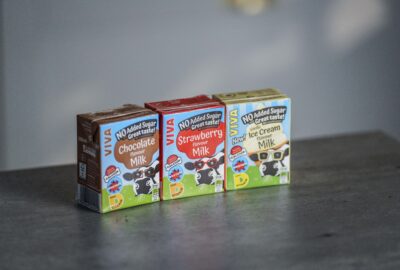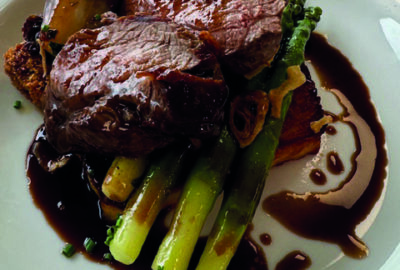Protecting and preserving our natural environment is of increasing importance, not only to us as operators within the hospitality sector, but to customers as well. Understanding that if we do not take action to slow down (and ultimately prevent) the decline of our natural resources, many restaurants and caterers have made significant changes to incorporate sustainable produce throughout their menus. In this month’s Melting Pot, our panel of experts proudly share some of their favourite sustainable dishes to inspire your team to link arms and follow their lead across all aspects of your menu.
Ellis Barrie Owner, Lerpwl
Located at Royal Albert Dock Liverpool, Lerpwl prides itself on a sustainable ethos. As the season changes, so does the menu, giving the chance for visitors to explore new flavours and chefs to innovate with fresh produce sourced from responsible, local agriculture and fisheries. One standout dish is our Menai Oysters from Anglesey. Not only are they on our doorstep, but they’re hugely important to the environment as they clean the seas and filter carbon as well as being naturally farmed and high in protein. They also don’t require any fresh water to farm unlike vegetable and meat farming.
Jonathan Fraser-Prinn Head of Bars, The Alchemist
The Alchemist have created a cocktail that is completely edible including the vessel. The Edible One consists of Manzana Verde, Avallen Calvados (delivered in Eco-Totes), lime sherbet, salted caramel, apple juice, white chocolate foam and is served in an edible cup in partnership with Stroodles.
The Stroodles edible cup is made from natural grains and totally biodegradable, 100% vegan and can hold hot and cold liquids for 40 minutes without disintegrating. For every Eco Tote purchased, a tree is planted in an ‘Alchemist Rainforest’. Guests can monitor how many trees are planted through a QR code on their menu.
Jaime Else Chef Manager, The Manor House Bupa Care Home
Our kitchen at The Manor House is open 24/7, and we are committed to operating with minimal environmental impact. We work to a ‘not needed, not on’ rule when it comes to our gas ovens, electric combi ovens, fryers and light switches.
We only order what we require and do our best to anticipate portion control. Peelings, cores, and any leftover vegetables are utilised in soups, salads, and stock. Any food that cannot be safely reused is placed in a compost bin and collected on a regular basis. Waste management is critical in are effort to reduce our carbon footprint. All our cardboard, plastic, tins, and paper are recycled and food waste, such as oil, is disposed of by specialists and repurposed as fuel.
Alex Connell Roving Chef, V for Life
When looking at the sustainability from an environmental perspective, simple changes can make a real difference. Moving towards a vegetarian or better still, vegan menu with dishes such as a root vegetable tagine or Welsh cakes for a teatime treat, can reduce your carbon footprint. According to researchers from the University of Oxford eating a vegan diet could be the “single best way” to reduce your environmental impact on Earth and, could reduce your carbon footprint by up to 73%. As caterers we have a great opportunity to improve the use of limited resources and help to improve the planet. Food for thought eh?
Callum GrahaM Executive Chef of Bohemia
We have great independent local suppliers, farmers and fishermen in Jersey that source fresh, seasonal ingredients to use within Bohemia’s dishes. We forage for unique sea herbs as well as fish and shellfish from our waters which can arrive at the kitchen an hour after landing on the fishing boats. There’s also the world-famous Jersey royals! We choose to source as sustainably as possible when we can because living on an island, you can’t rely on produce coming from elsewhere. We are also sensible with the quantity of what we use, such as only putting the Dry Aged Jersey Angus Sirloin of Beef on the menu for a limited period as there are so few cows on the island.
Colin Bhimani Chef, Canning Court Bupa Care Home
Our aim at Canning Court Bupa Care Home is to use as many fresh ingredients as possible across our menus and avoid processed foods, incorporating the fruit and vegetables we grow in our gardens. We make a conscious effort to serve more white meat as opposed to red meat and are always expanding our vegetarian menus. Options such as chickpea and spinach curry or goat’s cheese and red onion tart go down a treat. Meanwhile, fish such as herring and coley fillets serve as excellent sustainable options.
We serve homemade fresh soup to our residents every day. Just by replacing pre-made stock with home grown pulses, vegetables and herbs would make for a no-waste, packaging-free sustainable alternative in the future.
Hendre’ Barnard Production Manager, Jim and Tonic
Our pièce de resistance in terms of sustainable production – at least as far as the ingredients goes – is our JIM AND TONIC London Dry Gin. The entire recipe was created with sustainability in mind, so we exclusively used ingredients that can be found within the M25 – the orbital motorway that runs around central London. This means that we could potentially source every single one of the ingredients within 15 miles of our distillery location.
Jean Delport Executive Chef, Restaurant Interlude at Leonardslee Lakes and Gardens
We source our produce either directly from Leonardslee Lakes and Gardens estate or as locally as possible, as the dining experience is designed to showcase the estate through tasting menus of up to 21 courses. Local, seasonal produce is foraged from our 240-acre gardens – home to a variety of plants from around the world – and included within every course, whether that’s honey, eggs or pork. We’ve also developed great relationships with local farmers and producers.
We like to take guests on a culinary journey showcasing where the inspiration for our dishes comes from, which is what makes Restaurant Interlude so special. The most popular dish is ‘Rabbit Eats Carrot’ a rabbit mousse sphere with a variety of carrots, wild herbs, confit rabbit and charred home grown chilli jam.


